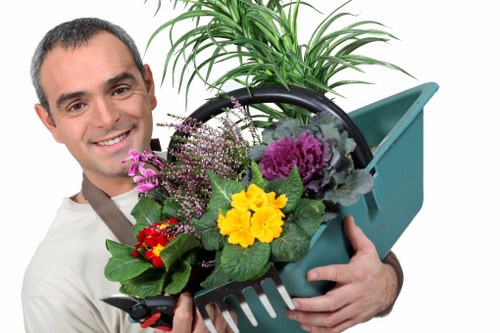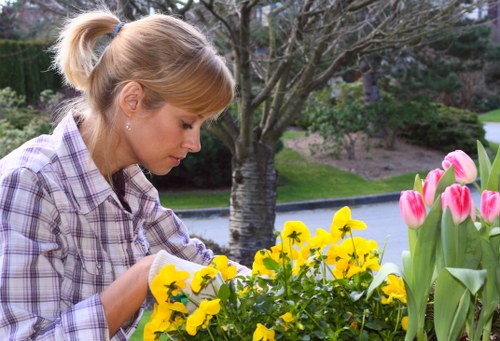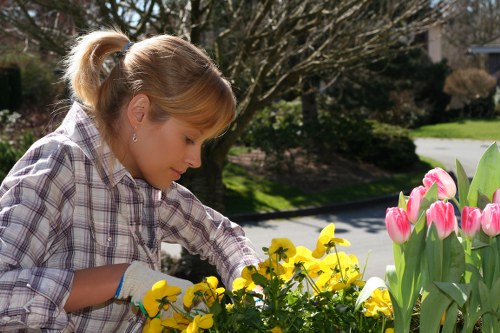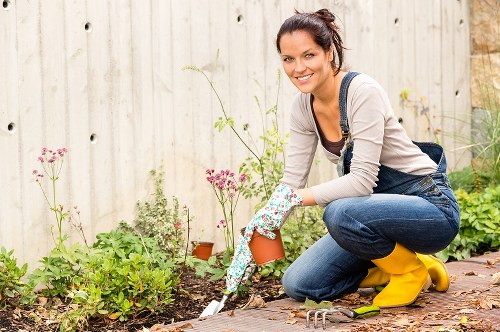Transform Your Outdoor Space with Quality Garden Fencing in Cleaners TW7
Introduction to Garden Fencing

Garden fencing is a crucial element in enhancing the aesthetics, privacy, and security of your outdoor space. Whether you're looking to delineate boundaries, create a safe environment for children and pets, or simply add a decorative touch, the right fencing can make all the difference.
In the Cleaners TW7 area, homeowners have access to a variety of fencing options tailored to suit different needs and preferences. From traditional wooden fences to modern metal designs, choosing the right material and style is essential for achieving the desired look and functionality.
This comprehensive guide will explore the various types of garden fencing available in Cleaners TW7, their benefits, installation tips, and maintenance practices to help you make an informed decision.
Types of Garden Fencing

Wooden Fencing
Wooden fences are a timeless choice that offers versatility and natural beauty. They can be customized with different stains, paints, and designs to match your garden's aesthetic.
Metal Fencing
Metal fences, including wrought iron and aluminum, provide durability and a sleek appearance. They are ideal for modern gardens and require minimal maintenance compared to other materials.
PVC and Vinyl Fencing
PVC and vinyl fences are low-maintenance alternatives that mimic the look of wood without the need for regular painting or staining. They are resistant to weathering, making them a practical choice for long-term use.
Choosing the Right Material

Selecting the appropriate fencing material depends on several factors, including budget, desired longevity, and the specific purpose of the fence. Here are some considerations to keep in mind:
- Budget: Wooden fences are generally more affordable upfront, but metal and vinyl options may offer better long-term value.
- Maintenance: Consider how much time and effort you're willing to invest in maintaining your fence. Metal and vinyl options typically require less upkeep.
- Purpose: Determine whether the fence is primarily for privacy, decoration, or security, as different materials excel in different areas.
By evaluating these factors, you can narrow down the best fencing material that aligns with your needs and preferences.
Design and Style Options

Traditional Designs
Traditional garden fences, such as picket fences and trellis designs, add a classic charm to any garden. They are perfect for creating a welcoming atmosphere and complementing cottage-style homes.
Modern Styles
For a more contemporary look, consider sleek metal panels or minimalist vinyl designs. Modern fences often feature clean lines and neutral colors, making them suitable for urban and suburban settings.
Customized Fencing
Customized fences allow you to incorporate unique elements, such as decorative panels, integrated lighting, or built-in planters. Personalizing your fence can enhance the overall beauty and functionality of your garden.
Installation Process

Proper installation is key to ensuring the longevity and effectiveness of your garden fence. Here are the steps involved in the installation process:
- Planning: Measure the area where the fence will be installed and mark the boundary lines.
- Material Selection: Choose the fencing materials and accessories based on your design and functional requirements.
- Preparation: Clear the installation area of any obstacles and ensure the ground is level.
- Post Installation: Set the fence posts firmly in the ground using concrete for added stability.
- Panel Attachment: Attach the fence panels or pickets to the posts according to the chosen design.
For a professional finish, consider hiring experienced installers who are familiar with the specific requirements of garden fencing in Cleaners TW7.
Maintenance Tips
Maintaining your garden fence is essential to preserve its appearance and functionality over time. Here are some maintenance tips for different types of fencing materials:
Wooden Fences
- Regularly inspect for signs of rot, warping, or pest damage.
- Apply a protective stain or paint every few years to prevent weathering.
- Clean the fence annually to remove dirt and debris.
Metal Fences
- Check for rust and corrosion, especially in damp climates.
- Apply a rust inhibitor or repaint as necessary to maintain appearance.
- Ensure that all bolts and fasteners are secure.
PVC and Vinyl Fences
- Wash the fence with mild soap and water to remove stains.
- Avoid using harsh chemicals that can damage the material.
- Inspect for cracks or gaps and repair them promptly.
Regular maintenance not only extends the life of your fence but also keeps your garden looking pristine.
Enhancing Your Fence with Additional Features
To further elevate the functionality and aesthetic appeal of your garden fence, consider incorporating additional features such as:
- Lighting: Integrated lighting can enhance the beauty of your fence at night and improve safety.
- Landscaping: Adding climbing plants or greenery can soften the fence's appearance and blend it seamlessly with the garden.
- Gates and Access Points: Well-designed gates provide easy access while maintaining the overall design continuity.
These enhancements not only add value to your property but also create a more inviting and functional outdoor space.
Cost Considerations

Material Costs
The cost of garden fencing varies significantly based on the material chosen. Wooden fences are generally more affordable, while metal and vinyl options tend to be pricier but offer greater durability.
Installation Expenses
Professional installation can add to the overall cost but ensures that the fence is installed correctly and securely. DIY installation can reduce costs but requires a certain level of skill and effort.
Maintenance Costs
Consider the long-term maintenance expenses associated with each type of fencing material. While some materials may have a higher initial cost, their lower maintenance requirements can result in overall savings.
Local Regulations and Permits
Before installing a garden fence in Cleaners TW7, it's important to be aware of any local regulations and permit requirements. These regulations may dictate aspects such as fence height, boundary placement, and material restrictions.
- Check with the local council for specific guidelines related to garden fencing.
- Ensure that your fence does not encroach on neighboring properties or public spaces.
- Obtain any necessary permits before commencing installation to avoid potential legal issues.
Adhering to local regulations ensures a smooth installation process and prevents future complications.
Benefits of Professional Installation

While DIY installation is an option, hiring professionals offers several advantages:
- Expertise: Professionals have the knowledge and experience to handle various fencing materials and designs.
- Time-Saving: Professional installers can complete the job more efficiently, allowing you to enjoy your new fence sooner.
- Quality Assurance: Ensuring that the fence is installed correctly reduces the risk of future issues such as leaning or gaps.
Investing in professional installation can provide peace of mind and enhance the overall quality of your garden fencing project.
Eco-Friendly Fencing Options
For environmentally conscious homeowners, there are several eco-friendly fencing options available:
Sustainable Wood
- Choose wood from sustainably managed forests to minimize environmental impact.
- Reclaimed wood is another eco-friendly option that adds unique character to your fence.
Recycled Materials
- Fences made from recycled metals or plastics reduce waste and promote sustainability.
- These materials often offer durability and low maintenance, making them a practical choice.
Solar-Powered Fencing
- Incorporate solar-powered lighting into your fence design for energy-efficient illumination.
- Solar panels can also be integrated to power other garden features.
Choosing eco-friendly fencing options contributes to a sustainable lifestyle while enhancing your garden's appearance.
Customization and Personalization

Personalizing your garden fence allows you to create a unique and tailored outdoor space. Here are some ways to customize your fence:
- Color and Finish: Select colors and finishes that complement your home's exterior and garden design.
- Decorative Elements: Add decorative panels, finials, or lattice inserts to enhance the fence's visual appeal.
- Functional Additions: Incorporate features such as built-in seating, trellises for climbing plants, or integrated storage solutions.
Customization ensures that your garden fence reflects your personal style and meets your specific needs.
Maximizing Privacy with Garden Fencing
Privacy is a common reason for installing a garden fence. Here are some fencing options that offer enhanced privacy:
Solid Panels
- Solid panel fences provide an unobstructed barrier, ensuring maximum privacy.
- They are ideal for creating secluded outdoor spaces and blocking noisy surroundings.
Lattice Screens
- Lattice screens offer partial privacy while allowing light and air to pass through.
- They are suitable for decorative purposes and can be combined with climbing plants for added coverage.
Hedge Fencing
- Combining fencing with hedges creates a natural privacy screen.
- Hedges provide additional greenery and can enhance the overall beauty of your garden.
Choosing the right fencing option can significantly improve the privacy and tranquility of your outdoor space.
Security Benefits of Garden Fencing

Beyond aesthetics and privacy, garden fencing plays a vital role in enhancing the security of your property:
- Deterrence: A sturdy fence can deter potential intruders from attempting to access your property.
- Boundary Definition: Clearly defined boundaries prevent unauthorized access and encroachment.
- Pet Safety: Secure fencing ensures that pets remain safely within the designated area, preventing them from wandering off.
Investing in a secure garden fence provides peace of mind and contributes to the overall safety of your home.
Integrating Fencing with Landscaping
Integrating your garden fence with the surrounding landscape enhances the overall harmony and beauty of your outdoor space:
- Plant Selection: Choose plants that complement the fencing material and style to create a cohesive look.
- Pathways and Access: Design pathways that incorporate the fence, providing easy access to different garden areas.
- Outdoor Structures: Combine fencing with pergolas, gazebos, or arbors to add architectural interest and functionality.
A well-integrated fence seamlessly blends with the landscape, creating a unified and inviting environment.
Seasonal Considerations for Garden Fencing
Different seasons can impact the condition and appearance of your garden fence. Here are some seasonal tips to maintain your fence throughout the year:
Spring
- Inspect the fence for any winter damage and make necessary repairs.
- Clean the fence to remove debris and prepare it for the growing season.
Summer
- Monitor for signs of sun damage or fading, especially for wooden and vinyl fences.
- Ensure that climbing plants are well-managed to prevent overgrowth.
Autumn
- Trim back any overhanging branches that could damage the fence during storms.
- Prepare the fence for colder weather by applying protective treatments.
Winter
- Protect wooden fences from frost and moisture by applying sealants.
- Clear snow and ice buildup to prevent structural stress.
Regular seasonal maintenance helps preserve the integrity and appearance of your garden fence year-round.
DIY vs. Professional Installation
Deciding between a DIY approach and hiring professionals for your garden fencing project depends on several factors:
- Skill Level: DIY installation requires certain skills and tools, whereas professionals bring expertise and experience.
- Time Commitment: Professional installers can complete the job faster, while DIY projects may take longer.
- Cost: While DIY can save on labor costs, professional installation ensures quality and may save money in the long run by preventing mistakes.
Evaluate your capabilities and resources to determine the best approach for your garden fencing project.
Benefits of DIY Installation
- Cost savings on labor.
- Personal satisfaction from completing the project.
- Flexibility in scheduling and execution.
Benefits of Professional Installation
- Expertise and quality workmanship.
- Access to professional tools and equipment.
- Warranty and support for installed fences.
Ultimately, the choice between DIY and professional installation depends on your specific needs, budget, and comfort level with home improvement projects.
Choosing the Right Fence Contractor
Selecting a reliable and experienced fence contractor is crucial for achieving the desired results. Consider the following when choosing a contractor in Cleaners TW7:
- Reputation: Look for contractors with positive reviews and testimonials from previous clients.
- Experience: Choose contractors who specialize in the type of fencing you desire.
- Licensing and Insurance: Ensure that the contractor is properly licensed and insured to protect against potential liabilities.
- Portfolio: Review the contractor's portfolio to assess the quality and style of their previous work.
Taking the time to research and select the right contractor ensures a smooth installation process and a high-quality finished fence.
Environmental Impact of Fencing Materials
Understanding the environmental impact of different fencing materials can guide you in making sustainable choices:
Wood
- Choose non-toxic, sustainably sourced wood to minimize environmental harm.
- Reclaimed wood options reduce wastage and promote recycling.
Metal
- Recycled metals are more eco-friendly compared to new metal production.
- Metal fences are long-lasting, reducing the need for frequent replacements.
PVC and Vinyl
- PVC production has environmental drawbacks, including the release of harmful chemicals.
- Opt for high-quality, recyclable vinyl products to mitigate some of the environmental impacts.
Choosing environmentally responsible materials contributes to a sustainable garden and reduces your ecological footprint.
Innovative Fencing Solutions
Embrace innovation with modern fencing solutions that offer enhanced functionality and style:
- Smart Fencing: Integrate technology such as automated gates, security cameras, and motion sensors into your fence design.
- Modular Fences: Flexible and customizable, modular fences allow for easy adjustments and expansions as needed.
- Eco-Friendly Innovations: Explore fences made from renewable materials or those that support local ecosystems.
Staying updated with the latest fencing trends can help you create a contemporary and efficient outdoor space.
Conclusion
A well-chosen garden fence not only enhances the beauty and functionality of your outdoor space but also provides essential benefits such as privacy, security, and boundary definition. In Cleaners TW7, homeowners have access to a wide range of fencing options, each with its unique advantages.
By carefully selecting the right material, design, and installation method, you can transform your garden into a stunning and secure haven. Whether you opt for the classic appeal of wood, the modern sleekness of metal, or the low-maintenance convenience of vinyl, the perfect garden fence awaits.
Ready to enhance your garden with a beautiful new fence? Contact us today to explore your options and book your service now.


